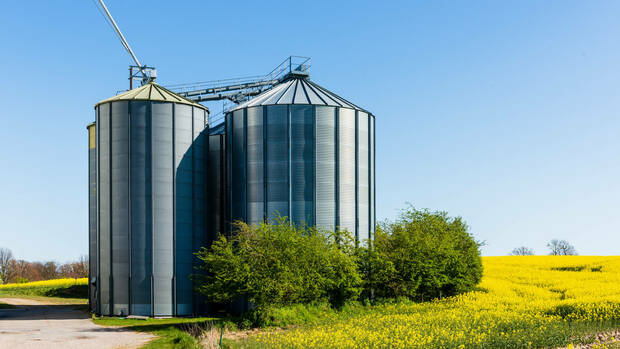Berlin The German biofuel industry is on the verge of collapse. The triggers are Chinese companies that are pushing into the German market. The situation is dramatic from the point of view of the Association of the German Biofuel Industry (VDB): “The companies in our industry have their backs to the wall, most see their economic existence in acute danger,” says VDB Managing Director Elmar Baumann. Biodiesel production in Germany has collapsed in recent months, and various companies have stopped production altogether, reports Baumann. “If the grievances are not eliminated, companies will be forced to close their plants in Germany.”
The VDB represents the entire range of biofuel production, i.e. production based on so-called “cultivated biomass” such as rapeseed, production from waste such as cooking fat and the production of biomethane from straw. In Germany, the industry represents around 20,000 jobs and around 6.5 billion euros in sales.
But the products from China are crowding out the German manufacturers because it is particularly attractive to deliver to Germany. This has the following background: The mineral oil industry is obliged to meet legally defined greenhouse gas reduction quotas, which will increase continuously up to 2030. In order to meet the quotas, the companies have various fulfillment options, such as adding biofuels.
However, the biofuels are assessed differently: Biofuel produced from rapeseed is only counted once, while fuel produced from waste and residual materials, which is considered “progressive” according to the legal definition, is counted twice. Within the greenhouse gas reduction quota there are minimum quotas for certain biofuel variants. Since October 2021, the following has applied to fuel from residues: if the minimum quota is exceeded, the overachieved percentage counts twice. This makes overachievement particularly interesting. Figuratively speaking: With one unit of biofuel from waste, two units of other biofuel variants can be replaced.
>> Read also: EU ambassadors approve e-fuel compromise
Due to the double counting, there has been a pull for advanced biofuels to Germany, which also applies to imports from China. According to industry information, Europe imported 674,000 tons of certified biodiesel from China in the period from January to April. If this amount is extrapolated over the year, it should be sufficient, according to industry information, to meet the legal quota for 2023. In the same period of the previous year it was still 324,000 tons.
Biofuel: Doubts about certification in China are growing
In the industry, one wonders whether it is credible that biodiesel production plants could be set up in China within a very short time, from which the imports are fed in such large quantities – especially since the production is technically complex and the plants are expensive. In addition, it is doubtful whether there is such an amount of used fat at all. It is therefore suspected in the industry that fresh vegetable oil is labeled as an “advanced” raw material in order to produce biodiesel with multiple credits.
“The low price and reports of a bungling sustainability certification in China and a lack of official controls suggest that broad-based fraud is involved,” says VDB Managing Director Baumann.
Greenpeace shares the industry’s concerns
Climate protection organizations such as Greenpeace also have doubts about the resilience of sustainability certification. “Reservations about the certification of biofuels are understandable. The system is prone to abuse,” says Matthias Lambrecht from Greenpeace.
The system is initially based on the manufacturer’s self-declaration. Only on the basis of the self-declaration does the work of the certifiers begin, who may then have assumed the wrong assumptions. “There have been a number of instances in the past where certifications have proven flawed and enabled large-scale fraud. That affected different countries of origin,” says Lambrecht.
With its legislation, the EU has created an enormous need for alternative fuels. As a result, there are price developments for the starting materials, which create enormous incentives for criminal activities.
But Lambrecht also has fundamental concerns: “It is ecologically questionable to import waste-based biofuels from other countries and then count the CO2 reduction here. These fuels can make a better contribution to reducing emissions in the countries of origin, and their use in the EU should be restricted to domestic waste,” recommends Lambrecht.
The Ministry of the Environment sees no need for action
From the point of view of the biofuel industry, the federal government must act quickly. “We call for the same strict requirements to be placed on sustainability certification for domestic biofuel production and imports from third countries. That means: allow random checks by the Federal Agency for Agriculture and Food (BLE), or you lose the special funding in Germany,” says Baumann.
He was convinced that this regulation would be WTO-compliant. According to his assessment, it could easily be regulated via the planned amendment to the 38th ordinance for the implementation of the Federal Immission Control Act (38th BImSchV).
Politicians see no need for action.
(Photo: imago images/photothek)
But the responsible Federal Ministry for the Environment waves it away. A spokeswoman said on request that the Federal Government or the EU Commission had not yet received any confirmation of the suspected cases of biofuels produced in China that were presumably unsustainable and imported into Europe. There are also no plans to change the sustainability requirements via the planned reform of the 38th BImSchV.
Baumann fears that the problem will spread to other areas – such as the planned CO2 border adjustment – and questions the reliability of certifications overall: If the planned CO2 border adjustment becomes reality, it will be crucial for industry in the EU how high it will be actual carbon footprint of steel or aluminum from China or other third countries. “The resilience of the certifications will then come into focus. If the countries of origin are not willing to allow more transparency, it is negligent to trust the certificates,” warns Baumann.
More: Habeck says goodbye to sector targets in climate protection
